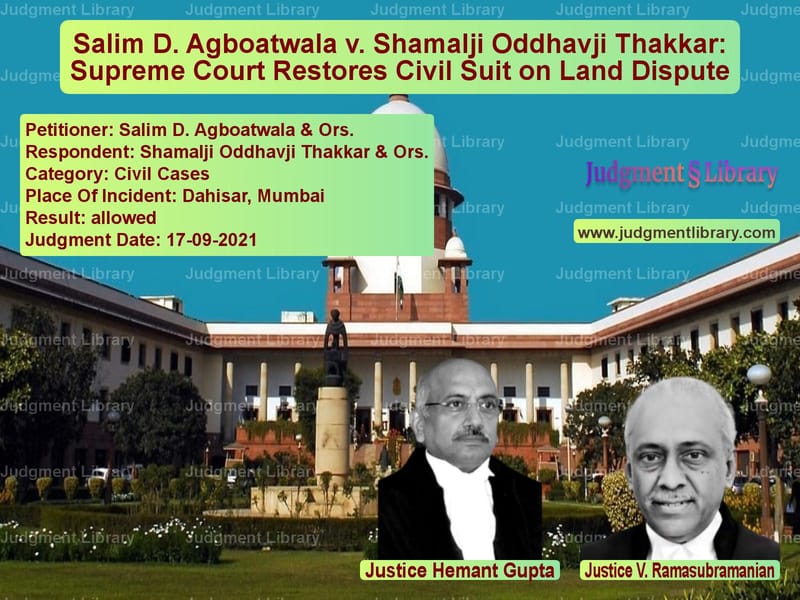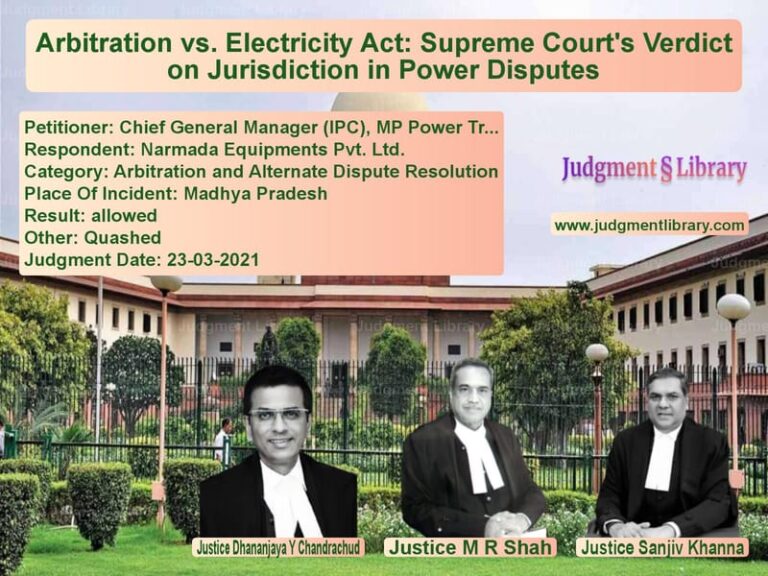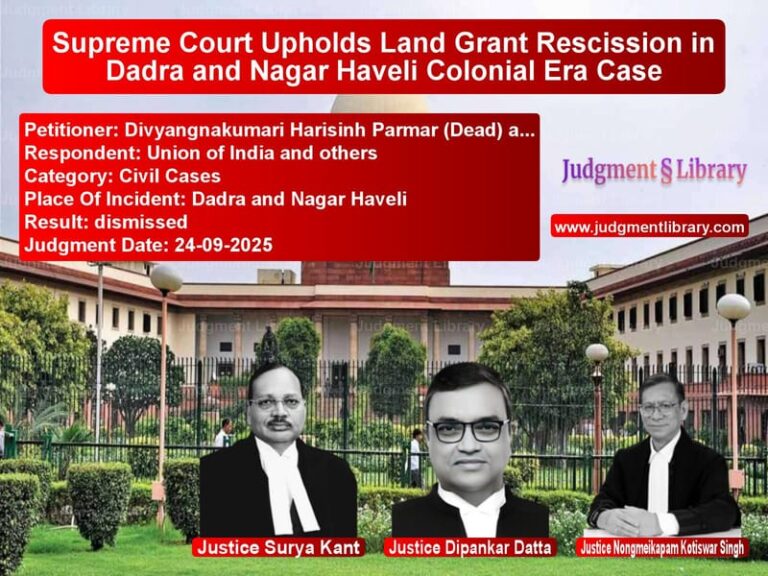Salim D. Agboatwala v. Shamalji Oddhavji Thakkar: Supreme Court Restores Civil Suit on Land Dispute
The case of Salim D. Agboatwala & Ors. v. Shamalji Oddhavji Thakkar & Ors. revolved around a long-standing property dispute concerning land in Dahisar, Mumbai. The case originated from the rejection of a civil suit by the trial court under Order VII Rule 11(d) of the Code of Civil Procedure, which was later upheld by the Bombay High Court. However, the Supreme Court ultimately reversed these decisions, reinstating the plaintiffs’ claim and emphasizing the importance of considering fraud and collusion in legal proceedings.
Background of the Case
The plaintiffs, legal heirs of Haji Ali Mohammed Hajee Kassam Agboatwala, filed a civil suit (S.C. Suit No. 2343 of 1987) before the City Civil Court in Bombay. They sought to declare null and void an order passed by the Agricultural Lands Tribunal (ALT) in 1963, which had recognized the defendant as a ‘deemed purchaser’ of the disputed land under the Maharashtra Tenancy and Agricultural Lands Act, 1948. The plaintiffs also challenged the issuance of a sale certificate under Section 32M of the Act.
The plaintiffs contended that the land, originally under court receivership since 1950, had been fraudulently transferred through proceedings they were never made aware of. They argued that these transfers happened without proper notification and behind their backs. The defendants, however, countered that the suit was barred by limitation and that the civil court had no jurisdiction under Section 85 of the Tenancy Act.
Arguments by the Petitioner (Plaintiffs)
The plaintiffs, represented by senior counsel, advanced the following arguments:
- They had no prior knowledge of the tenancy proceedings, and they only discovered the alleged fraudulent transactions when they inspected court receiver records.
- The tenancy proceedings were collusive, fraudulent, and null and void.
- Since they were not given notice of the proceedings, they were entitled to approach the court upon gaining knowledge.
- Limitation could not be used against them since fraud vitiates all legal proceedings.
Arguments by the Respondents
The defendants, represented by senior counsel, contended that:
- The suit was filed decades after the ALT’s decision, making it time-barred.
- The plaintiffs had constructive notice of the proceedings and should have challenged them earlier.
- Under Section 85 of the Tenancy Act, civil courts lacked jurisdiction to hear the case.
Supreme Court’s Ruling
The Supreme Court, comprising Justices Hemant Gupta and V. Ramasubramanian, overturned the decisions of the trial court and the Bombay High Court. The key findings of the Supreme Court were:
- On Limitation: Limitation is a mixed question of fact and law. Since the plaintiffs claimed they gained knowledge of the proceedings much later, their suit could not be rejected outright on limitation grounds without further examination.
- On Jurisdiction: While Section 85 of the Tenancy Act bars civil courts from adjudicating tenancy-related disputes, Section 85A provides an exception by allowing courts to refer certain issues to competent authorities. The courts below had erred in not considering this provision.
- On Fraud and Collusion: The Supreme Court reiterated that fraud vitiates all proceedings. The plaintiffs’ claim that the ALT’s order was obtained through collusion required further scrutiny, which could not be done at the initial stage.
Key Observations by the Supreme Court
The Court made critical observations regarding the rejection of the plaint under Order VII Rule 11(d):
“The rejection of plaint under Order VII Rule 11 is a drastic power conferred on the Court to terminate a civil action at the threshold. Therefore, the conditions precedent to the exercise of the power are stringent.”
The Court further emphasized:
“When a plaintiff claims that he gained knowledge of the essential facts giving rise to the cause of action only at a particular point of time, the same has to be accepted at the stage of considering the application under Order VII Rule 11.”
Implications of the Judgment
This judgment carries important legal implications:
- It clarifies that civil courts cannot dismiss suits outright without allowing plaintiffs to present evidence in cases where fraud is alleged.
- It underscores the importance of fair adjudication and the necessity of giving parties the opportunity to prove their claims.
- It provides relief to legal heirs who may have been denied justice due to administrative or procedural lapses.
Conclusion
The Supreme Court’s decision in Salim D. Agboatwala & Ors. v. Shamalji Oddhavji Thakkar & Ors. is a significant ruling on property disputes, fraud, and jurisdictional limitations under the Maharashtra Tenancy Act. By restoring the suit, the Court ensured that legal heirs had a chance to prove their claims rather than being denied justice at the preliminary stage. This case serves as a crucial precedent in matters where fraud is alleged, reaffirming that courts must be cautious before dismissing claims without proper examination.
Petitioner Name: Salim D. Agboatwala & Ors..Respondent Name: Shamalji Oddhavji Thakkar & Ors..Judgment By: Justice Hemant Gupta, Justice V. Ramasubramanian.Place Of Incident: Dahisar, Mumbai.Judgment Date: 17-09-2021.
Don’t miss out on the full details! Download the complete judgment in PDF format below and gain valuable insights instantly!
Download Judgment: salim-d.-agboatwala-vs-shamalji-oddhavji-th-supreme-court-of-india-judgment-dated-17-09-2021.pdf
Directly Download Judgment: Directly download this Judgment
See all petitions in Property Disputes
See all petitions in Landlord-Tenant Disputes
See all petitions in Specific Performance
See all petitions in Judgment by Hemant Gupta
See all petitions in Judgment by V. Ramasubramanian
See all petitions in allowed
See all petitions in supreme court of India judgments September 2021
See all petitions in 2021 judgments
See all posts in Civil Cases Category
See all allowed petitions in Civil Cases Category
See all Dismissed petitions in Civil Cases Category
See all partially allowed petitions in Civil Cases Category







